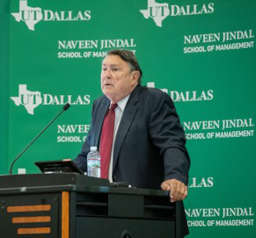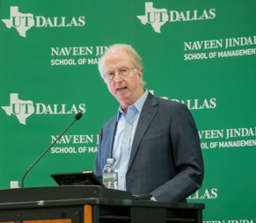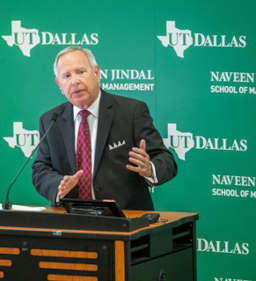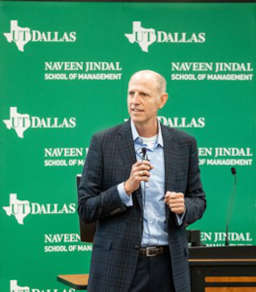A panel of healthcare experts weighed in on the various “Medicare for All” proposals currently being considered in Congress and offered solutions of their own at a recent Naveen Jindal School of Management seminar.
The panel discussion, “Medicare for All: What Does It Really Mean?” was presented by the Jindal School’s Center for Healthcare Leadership and Management. An audience of more than 150 early-rising students, faculty and healthcare professionals congregated in the Davidson Auditorium Oct. 7 for the 7:30 a.m. discussion.

Dr. Forney Fleming, a clinical professor in the Organizations, Strategy and International Management academic area and long-time director of the master’s program in healthcare leadership and management at the Jindal School, served as moderator. He began by laying out in stark terms the reason for having such a discussion, one that centered on the various proposals in play that would radically overhaul the healthcare system if enacted.
In terms of gross domestic product or per capita, “we spend about twice as much for our healthcare as other well-developed countries do,” he said. “But what do we get for that expenditure? Well, unfortunately, in terms of overall quality, the United States ranks very poorly.”
Rising healthcare costs — the average healthcare premium for a family of four is now in excess of $20,000 — combined with rising out-of-pocket increases, high deductibles and stagnant wage increases cause healthcare to become unaffordable for many Americans, Fleming said. Add to this problem the huge number of baby boomers who are added to the Medicare rolls at a rate of 10,000 per day. He said that all of these factors render the healthcare system economically unsustainable and explain why we are in a situation in which many Americans feel the need to entertain radical changes such as those being discussed daily on the campaign trail by presidential candidates.

Dr. Paul Convery, a clinical professor in Executive Education at JSOM, described in detail the various flavors of Medicare-for-All bills that have been filed in the 116th U.S. Congress. Proposals include expansion of state- or Medicaid-subsidized individual premiums, tweaks to the current Affordable Care Act, Medicare buy-in for those 50 years or older (down from the current age of 65) and the single-payer national healthcare system proposed by Sen. Bernie Sanders.
“It’s not surprising for me that Medicare-for-All or discussion of a national health insurance program is on the agenda this election cycle,” Convery said. “What is surprising is that it’s a major topic and — for the first time in 50 years — it has broad support and majority support across the American public.”
Next up, Steve Love, president and CEO of the Dallas-Fort Worth Hospital Council, described the various Medicare-for-All proposals as simply a cry for help and urged caution in the discussion as well as a close look at the details.
“We’re all moving down this road of Medicare for All, and I’m not sure it’s really been looked at from a cost point of view and what all the ramifications are,” he said. “…[T]his is certainly the right goal — and the right goal is to lower healthcare costs and give coverage to [more] people and access [to more people] — but I’m not sure we’re going down the right path.”

Love said that transparency in healthcare costs and increasing access to healthcare rather than providing additional coverage is what people really need.
“If we can all work together and strive to come up with a solution that will answer these questions, it might be a good alternative to Medicare for All, and, in the long run, it may be cheaper,” he said.

David Toomey, senior vice-president at ShareCare, a digital health-and-wellness engagement platform, concluded the presentation by offering an alternative solution to spiraling healthcare costs, namely, reducing waste. To lay it out, he focused on one particular healthcare issue — the wide variation among healthcare organizations in cost of treating back pain.
Toomey described the lengthy, wasteful treatment process Starbucks baristas had to go through to treat the back pain from which they often suffer because they have to stand for much of their shifts. First, baristas scheduled an appointment with a doctor, then they waited, then they scheduled a follow-up with a specialist, then they waited again, then they had an MRI, then they got a review of the MRI, then they got a consultation with another specialist, then they saw a podiatrist, and then finally they started physical therapy.
Since patients ended up in physical therapy 83 percent of the time, Starbucks set up a treatment process by which their baristas went straight to a spine clinic and immediately began physical therapy. Doing so removed the waste by eliminating the inefficient parts of the process.
“I’m going to find the … really good doctors that are a part of a high-quality, Six-Sigma approach to healthcare,” he said. “[This is] free-market competition. We cannot wait for the government to fix healthcare. We’ve been talking about it forever, and it’s the same old, same old. I appreciate the hyperbole, but the reality is we can’t afford this.”
During the concluding question-and- answer session, the panelists were asked how pricing transparency could help solve the problem of out-of-control healthcare spending. Convery proposed a free-market system that is augmented by some sort of government regulation. He also pointed to Surgery Center of Oklahoma, a medical practice that lists its prices on its websites, as an example of how pricing transparency can work.
“If they can do it, it’s not undoable,” he said. “It’s not because we’re not smart enough. I think we’re smart enough to not make things transparent.”
Watch the video of the Center for Healthcare Leadership and Management seminar, “Medicare for All: What Does It Really Mean?” on YouTube.






